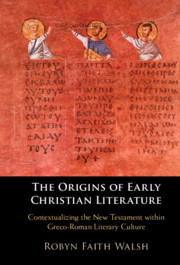 The Origins of Early Christian Literature
The Origins of Early Christian Literature Published online by Cambridge University Press: 23 January 2021
Chapter 1 discusses how the categories of analysis traditionally used by scholars of the New Testament and early Christianity can be refined, with critical attention paid to terminology, vocabulary, and anachronism. Invoking the work of J. Z. Smith, Stanley Stowers, Eric Hobsbawm, and others, this chapter challenges how Christianity was rhetorically “invented” after the first century and how a figure like Paul the Apostle was transformed into one of the founders of Christianity, despite questions about how effective his so-called ministry was at creating cohesion about presumed Christian “communities.”
To save this book to your Kindle, first ensure no-reply@cambridge.org is added to your Approved Personal Document E-mail List under your Personal Document Settings on the Manage Your Content and Devices page of your Amazon account. Then enter the ‘name’ part of your Kindle email address below. Find out more about saving to your Kindle.
Note you can select to save to either the @free.kindle.com or @kindle.com variations. ‘@free.kindle.com’ emails are free but can only be saved to your device when it is connected to wi-fi. ‘@kindle.com’ emails can be delivered even when you are not connected to wi-fi, but note that service fees apply.
Find out more about the Kindle Personal Document Service.
To save content items to your account, please confirm that you agree to abide by our usage policies. If this is the first time you use this feature, you will be asked to authorise Cambridge Core to connect with your account. Find out more about saving content to Dropbox.
To save content items to your account, please confirm that you agree to abide by our usage policies. If this is the first time you use this feature, you will be asked to authorise Cambridge Core to connect with your account. Find out more about saving content to Google Drive.